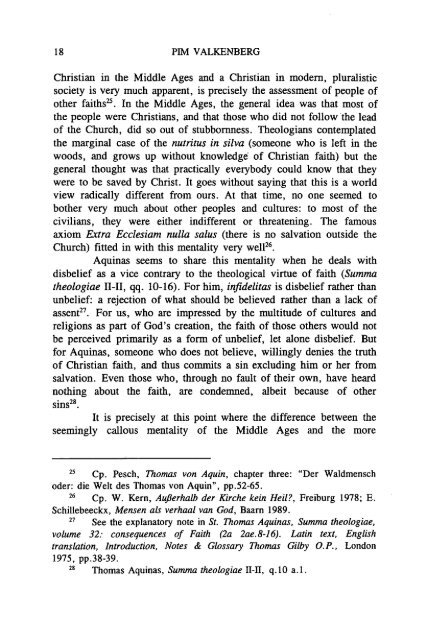Jaarboek Thomas Instituut 1997 - Thomas Instituut te Utrecht
Jaarboek Thomas Instituut 1997 - Thomas Instituut te Utrecht
Jaarboek Thomas Instituut 1997 - Thomas Instituut te Utrecht
Create successful ePaper yourself
Turn your PDF publications into a flip-book with our unique Google optimized e-Paper software.
18 PIM VALKENBERG<br />
Christian in the Middle Ages and a Christian in modem, pluralistic<br />
society is very much apparent, is precisely the assessment of people of<br />
other faiths". In the Middle Ages, the general idea was that most of<br />
the people were Christians, and that those who did not follow the lead<br />
of the Church, did so out of stubbornness. Theologians con<strong>te</strong>mpla<strong>te</strong>d<br />
the marginal case of the nutritus in silva (someone who is left in the<br />
woods, and grows up without knowledge' of Christian faith) but the<br />
general thought was that practically everybody could know that they<br />
were to be saved by Christ. It goes without saying that this is a world<br />
view radically different from ours. At that time, no one seemed to<br />
bother very much about other peoples and cultures: to most of the<br />
civilians, they were either indifferent or threa<strong>te</strong>ning. The famous<br />
axiom Extra Ecclesiam nulla salus (there is no salvation outside the<br />
Church) fit<strong>te</strong>d in with this mentality very welf".<br />
Aquinas seems to share this mentality when he deals with<br />
disbelief as a vice contrary to the theological virtue of faith (Summa<br />
theologiae II-II, qq. 10-16). For him, infidelitas is disbelief rather than<br />
unbelief: a rejection of what should be believed rather than a lack of<br />
assent". For us, who are impressed by the multitude of cultures and<br />
religions as part of God's creation, the faith of those others would not<br />
be perceived primarily as a form of unbelief, let alone disbelief. But<br />
for Aquinas, someone who does not believe, willingly denies the truth<br />
of Christian faith, and thus commits a sin excluding him or her from<br />
salvation. Even those who, through no fault of their own, have heard<br />
nothing about the faith, are condemned, albeit because of other<br />
sins".<br />
It is precisely at this point where the difference between the<br />
seemingly callous mentality of the Middle Ages and the more<br />
25 Cp. Pesch, <strong>Thomas</strong> von Aquin, chap<strong>te</strong>r three: "Der Waldmensch<br />
oder: die Welt des <strong>Thomas</strong> von Aquin", pp.52-65.<br />
26 Cp. W, Kern, AujJerhaLbder Kirche kein Heil?, Freiburg 1978; E.<br />
Schillebeeckx, Mensen als verhaal van God, Baarn 1989.<br />
27 See the explanatory no<strong>te</strong> in St. <strong>Thomas</strong> Aquinas, Summa theologiae,<br />
volume 32: consequences of Faith (2a 2ae.8-16). Latin <strong>te</strong>xt, English<br />
translation, lntroduction, No<strong>te</strong>s & Glossary <strong>Thomas</strong> Gilby O.P., London<br />
1975, pp.38-39.<br />
28 <strong>Thomas</strong> Aquinas, Summa theologiae II-II, q.lO a.1.








